|
|
|
Sort Order |
|
|
|
Items / Page
|
|
|
|
|
|
|
| Srl | Item |
| 1 |
ID:
144741
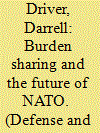

|
|
|
|
|
| Summary/Abstract |
The US role in the North Atlantic Treaty Organization (NATO) Alliance is a 65-year history of retrenchment and renewal. When Washington has sought a retrenchment from the world, it traditionally increased burden sharing pressure on Europe to do more. During times of increased global ambition, the USA reaffirmed its traditional leadership role in the Alliance and its commitment to NATO effectiveness and relevance. This cycle of NATO retrenchment and renewal, however, is halting. Though the USA will continue to go through periods of relative increases and decreases in security policy ambition, signs point to a permanent defense and security retrenchment in Europe. Germany is the ally singularly capable of filling the resulting security gap. If NATO is to avoid the drift toward irrelevance many critics have predicted, Germany will need to cast off old inhibitions toward security and defense leadership. These trends and their implications for NATO's future are explored through historical case studies and the shifting contemporary security environment.
|
|
|
|
|
|
|
|
|
|
|
|
|
|
|
|
| 2 |
ID:
144745
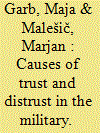

|
|
|
|
|
| Summary/Abstract |
Trust in institutions is an important issue of political science and sociology. This article contributes to the discussion by exploring public trust in the military at the global, regional and national levels, and the causes of trust and distrust in the military. Analyses of public opinion data reveal that the military is a highly trusted social institution across the world. In Slovenia, the trust in the military is high as well; however, it is lower than international data would suggest, averaging at 50%. Against this background, the article focuses on the causes of trust. The original empirical survey was accomplished and shows that the most significant causes of a high level of trust in the military are its frequent and successful involvement in disaster relief, its professional qualifications and high performance, as well as its national defense role. Whereas the key causes of distrust are: the poor levels of transparency in its procurement process; the politicization of the military and organizational problems.
|
|
|
|
|
|
|
|
|
|
|
|
|
|
|
|
| 3 |
ID:
144747
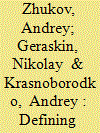

|
|
|
|
|
| Summary/Abstract |
The article is devoted to problems of defining quantitative criteria for the physical protection system (PPS) effectiveness of nuclear facilities. The article briefly describes the scheme of the PPS development used in the nuclear industry in Russia, gives a review of existing approaches to defining the minimal acceptable value of the system's effectiveness, and reveals advantages and disadvantages of the approaches. The article describes in detail an approach based on facility categorization by potential losses and a technique of defining the minimal acceptable value of the PPS effectiveness developed on its base.
|
|
|
|
|
|
|
|
|
|
|
|
|
|
|
|
| 4 |
ID:
144746
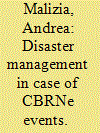

|
|
|
|
|
| Summary/Abstract |
Nowadays, Chemical-Biological-Radiological-Nuclear-explosive (CBRNe) risks are one of the world's main safety concerns. The radiological disasters of Fukushima and Chernobyl, the chemical events of Seveso or the release of Sarin in the Tokyo Subway, the biological emergencies such as the H1N1 flu or the recent Ebola outbreak, and recent news about the availability of non-conventional weapons acquired by fundamentalist organisations represent evidence of potential future threats. CBRNe risks are a real and global threat. The University of Rome, Tor Vergata, in collaboration with the most important Italian and international bodies working in the field of CBRNe safety and security, and supported by the North Atlantic Treaty Organisation and the Organisation for the Prohibition of Chemical Weapons, organises International Masters Courses on the Protection against CBRNe events. Within this framework, a Table-Top Exercise was planned, in collaboration with the Italian Ministry of Interior and Ministry of Defence. The scenario, the logistic organisation, on-going adjustments during the exercise and the outcomes are presented here and analysed.
|
|
|
|
|
|
|
|
|
|
|
|
|
|
|
|
| 5 |
ID:
144743
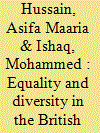

|
|
|
|
|
| Summary/Abstract |
The UK's changing political and legal landscape since 2000 reflecting transformations in wider society have elevated equality and diversity (E&D) issues to prominence in the public sector, including in the British armed forces. This research highlights key developments in the British military in relation to E&D, focusing both on areas of progress, and on the challenges still confronting the Forces. The findings reveal that the Forces have made significant strides in advancing E&D through the implementation of a range of policy initiatives but the persistence of discrimination, developments in the wider environment and the dilemmas raised by the strands of age and disability pose challenges. The value of this research is to increase our understanding of diversity management in a public sector institution that has been under-researched and views itself as “different,” and will be of interest to policymakers, E&D practitioners and academics in the field.
|
|
|
|
|
|
|
|
|
|
|
|
|
|
|
|
| 6 |
ID:
144742
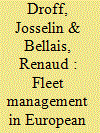

|
|
|
|
|
| Summary/Abstract |
The article focuses on both economics and spatial issues related to Maintenance Repair and Overhaul (MRO) of defence platforms in Europe. Using facts and figures related to costs, trends and fleet sizes evolution, the authors discuss the interest of a spatial reorganisation of MRO production. Given the fiscal situation of the main European countries with a modern army, the relevant scale to consider the reorganisation is certainly Europe. Through the example of defence helicopters fleets of a selection of European countries, the authors address the question of cooperation of the MRO. A greater cooperation in the support of fleets would lead to a spatial reorganisation of MRO. On one side economies can be expected from this reorganisation, but, on the other hand, new problems arise. Specifically, a number of costs associated with different forms of “distances” – geographical, operational and political distances – limit the potential savings that could be expected. This work provides insights on these important issues for the construction of a European defence, both in its political, military and industrial dimensions.
|
|
|
|
|
|
|
|
|
|
|
|
|
|
|
|
| 7 |
ID:
144748
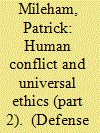

|
|
|
|
|
| Summary/Abstract |
This second part of the review article begins with a definition of military power, when and how it should be used. From a large number of authors, “moral forces” are linked to “codes of conduct”, and the fundamental understandings about the “profession of arms”, based on “fiduciary trust”, “covenanted” service and professional and personal “conscience”. The article covers what authors have written about “culture” and the ethics of “technology” devices and systems, including “cyber” warfare. It concludes with recognition of the increase in ethical sensitivity in this century which is characterized by a phenomenon, the crises of “identity”, personal, national and global.
|
|
|
|
|
|
|
|
|
|
|
|
|
|
|
|
| 8 |
ID:
144744


|
|
|
|
|
| Summary/Abstract |
The embellishment of a warrior biography has a long history but examples of veteran elaboration of traumatic experience have become increasingly apparent. Although legislative change in the UK has removed the penalties for fabrication and a progressive decline in the military footprint may have increased the likelihood of such false trauma narratives, a paradigm shift in explanations for mental illness underpins this phenomenon. The recognition of post-traumatic stress disorder (PTSD) in 1980, followed by studies to identify risk factors, led to a greater appreciation of psychological vulnerability. As a result, the use of shame to discourage acts formerly labelled as “cowardly” or “lacking in morale fibre” is no longer considered appropriate. Recent conflicts in Iraq and Afghanistan generated popular sympathy for service personnel, whilst media focus on PTSD has led the UK public to believe that most veterans have been traumatised by their tours of duty.
|
|
|
|
|
|
|
|
|
|
|
|
|
|
|
|
|
|
|
|
|